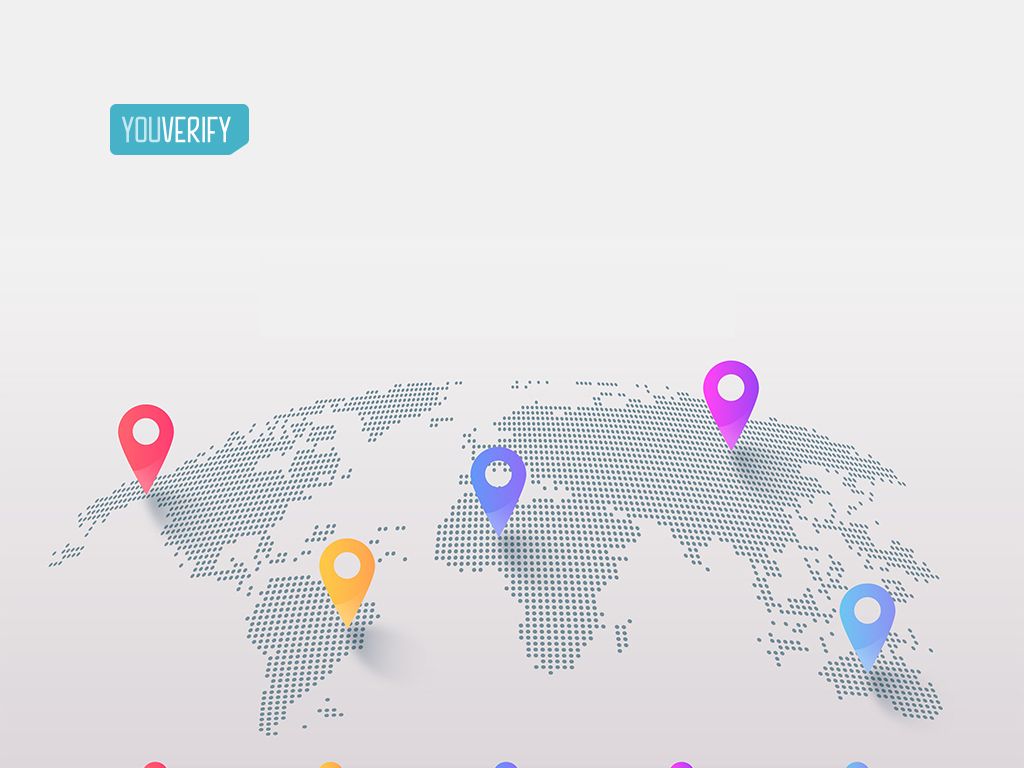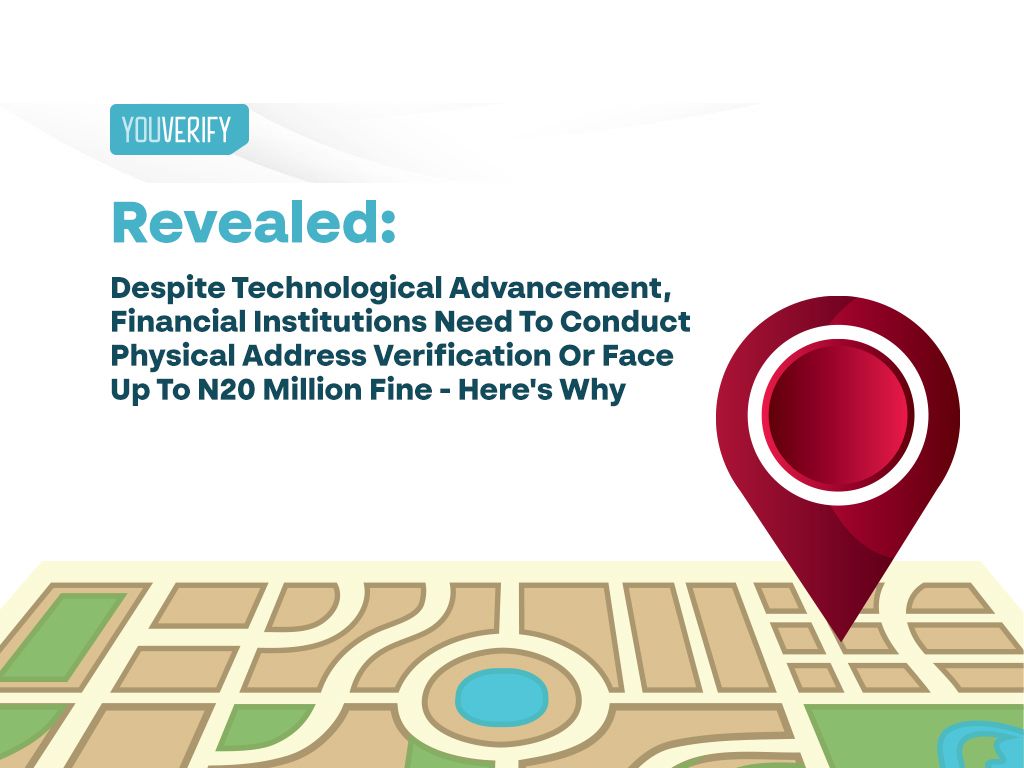Ever tried to open a bank account? Then this statement must sound familiar.
"Please come along with a copy of your ID card (Govt issued), your BVN, a utility bill, and two passport photographs" - This statement is one many Nigerians, and Africans at large have become very wary of.
Government-issued IDs are understandable, and so is BVN, however, many still wonder why financial institutions request a utility bill, especially “a recent NEPA Bill” especially considering how advanced technology is today.
Fortunately, there is a good reason for that. Financial institutions don't actually need your “NEPA bill” but rather require proof of address to perform physical address verification or face up to N20 Million in fines from regulatory bodies.
Unfortunately, the current level of technology cannot save them and here's why:
The Major Problem with Adress Verification in Developing countries
Firstly, what is address verification? Address verification, or customer address verification, is the process of confirming that the residential or business address verification that a person or organization provides is genuine, accurate, and actually linked to them. It's no news that AML regulations mandate financial institutions to carry out address verification on their customer from an independently verifiable source. This is why you need to provide proof of address when you visit a bank to open an account e.g your “NEPA” bill. Financial institutions only accept utility bills as a way to ensure you only provide a legit address.

However, the financial institutions are further required to verify that address and confirm that you actually live there. As of today, financial institutions still manually visit those addresses to verify if the customer actually stays there. Although this customer address verification method, or business address verification method, mode of operation looks archaic, there is a good reason why it is still preferred despite today's modern data verification technologies.
Firstly, a large portion of land mass is not properly mapped in most developing countries. In Nigeria alone, over 70% of the landmass does not have addresses; this is further complicated by the unavailability of electric meters in most homes. The result of this is that 70% of people in Nigeria cannot prove their respective addresses.
In summary, gaps in metering and local addressing standards are a limitation to efficient address verification in Nigeria. Also, we can safely conclude that 70% of people can't provide their legit address in Nigeria.
It's worthy to mention that this problem has been identified and even committees set up to address it. The National Addressing Council was set up in 2017 to address this issue, among others; however, there has been little or no progress to date.
Also, tech giants like Google have long searched for a solution to this problem across Africa, launching digital platforms like pluscode and GhanaGPS. However, the limitations discussed earlier have hindered any tangible progress from being made. Google Maps relies on a country’s national database for address accuracy, effectively rendering it unreliable in a country like Nigeria with a poor addressing system. Even Google Maps can’t help you navigate in slum areas.
Although digital address verification using AI seems like an easy solution to the manual address verification process in Nigeria, the lack of proper land mapping makes it not a viable option at the moment. Despite these obvious difficulties and constraints, financial institutions need to physically verify the address of customers to meet AML regulations.
This is why physical address verification is used in Nigeria and most other developing countries. Youverify’s address verification service perfectly fills in this gap.
How Youverify Quality Assured Address Verification Service Solves This Problem
As said earlier, the first solution that may cross your mind is Google Maps. But if you have ever used Google Maps outside of Lagos, or even in more remote parts of Lagos, then you will understand how difficult it is to find your way most times. While coordinates work perfectly, addresses on Google Maps are largely hindered by native words (which can be similar and wrong in most cases) and wrong administrative zones.
This is why we at Youverify built a physical addressing solution that combines high-level technology with human verification to ensure that our customers get the most accurate results at all times.
As one of the two physical address verification service providers in Nigeria, Youverify’s address verification platform handles hundreds of customer address verifications and business address verifications on a daily basis. Our advanced physical address verification service platform is multi-layered with AI and human intervention to ensure quality assurance.
This means when you submit an address verification request on our platform, our AI runs it through over 1 million confirmed physical addresses for an immediate match. If there is one, the address is confirmed as valid. However, we also have on-ground agents across the 36 states of Nigeria, who, at the request, proceed to visit the location and verify if the address is valid and if the person actually resides at the address they provided or not.
Read Also - Central Bank of Egypt Announces Know Your Customer (KYC) Program to Enable People Open Accounts Online
How Youverify’s Data Enrichment Structure is Changing the Address Verification Landscape
Although our address verification service currently plugs in the physical address verification gap, we understand that the country as a whole needs to move to a more digitally driven method of operation. As a result, we have taken conscious efforts to create a data enrichment system in anticipation of the future.
Our address data enrichment system ensures 100% resolution by mapping data. Basically, this is possible through the collection of successfully verified addresses from our hundreds of address verification daily requests. These verified addresses have been collated and used to create an adequate mapping for areas that have not been captured previously. For every new address we verify, we record it in our address pack as valid.
This way, we are constantly mapping unmapped address areas through our constantly updated address pack. It's a worthy note that Youverify is the only provider of this service in Nigeria and the whole of Africa and it is completely free!
Youverify Address Tracking
Taking address verification solution a bit further, we understand that physical address verification is suitable for organizations with high risks and regulatory requirements. However, SMEs, startups, and marketplaces do not face the same strict rules but still require address verification for KYC.
Youverify designed a simplified address tracking, suitable for such organizations with less stringent regulatory requirements. Here’s how it works:
YouID Address Tracker is an end-to-end digital address tracking and verification feature that allows a user to capture, verify, and store their addresses using GPS technology. Users can share their verified addresses with organizations and businesses in a digital format.
The way it works is that when a user adds an address, YouID app will request location permission on the user’s device to continuously monitor and track the inputted address details against the actual location from GPS for 2 to 7 days. If that actual location tracked at different times matches the inputted address, then it is verified; otherwise, it is not.
This feature embedded in YouID solves address verification problems in real-time for businesses that do not have the financial muscle for physical address verification. All the businesses need to do is join the YouID marketplace, and they can verify their customers’ addresses in real time.
Bottom Line
Physical address verification is very important for KYC compliance today in Africa, and with good reasons. Although current technology seems well ahead, manual physical address verification remains the most effective means to satisfy compliance due to the lack of adequate data infrastructures.
Would there come a time when it can be carried out using technology? Of course, technology is progressing rapidly along with data infrastructure growth. The time would most certainly come, but until then, physical address verification remains one of the most important steps for KYC and satisfying compliance.
As one of the two physical address verification service providers in Nigeria, we understand firsthand the relevance of physical address verification in a weak data infrastructural landscape like Africa. This is why we have field agents who cover this task manually and report with photo proof and geotagging.
See how 100+ leading companies use Youverify for KYC and AML screening of customers for compliance and real-time risk detection. Request a demo today.
